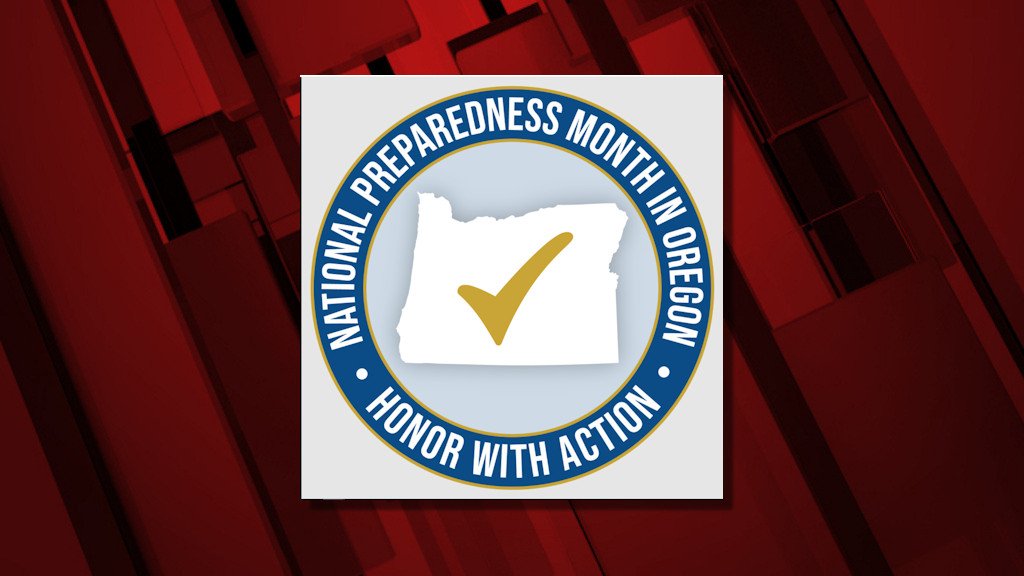Year after destructive wildfires hit Oregon, emergency managers urge preparation for disasters

SALEM, Ore. (KTVZ) – One year after severe drought and extreme winds fueled the most destructive wildfires in the state’s history, Oregon continues to recover and rebuild – while preparing for the next disaster. September is National Preparedness Month, a timely opportunity to emphasize the importance of being prepared.
“The depth of loss from the 2020 wildfires was extraordinarily profound for so many. In acknowledgment of these impacts throughout our state, we’re calling on Oregonians to ‘honor with action’ this National Preparedness Month,” said OEM Director Andrew Phelps. “It’s important Oregonians feel empowered to take actions right now to help keep themselves, their families and their communities safe. Together, we can honor those who have lost so much with actions that mean so much.”
These actions can be as simple as signing up for emergency alerts, reviewing community evacuation routes, or talking with a neighbor who may need some extra help during an emergency – all are measures that can mean the difference between being a disaster survivor or a disaster victim.
Over the past year, Oregonians have faced historic ice storms, tragic heat events and yet another severe wildfire season. The seemingly endless cycle of emergencies and disasters is not only an indicator of what’s to come – but also of the collective lack of readiness to face it. Phelps noted that one of the most difficult hazards to mitigate against is the hazard of apathy and the notion that so many people think emergencies won’t happen to them, or that they have time to prepare later.
“Disasters don’t wait for us to be ready, and when they strike, the time to prepare has passed. We know disasters affect Oregonians in different ways, and that each of us can be impacted by fires, floods, utility outages, severe weather and other hazards. As we work to build a culture of preparedness in Oregon, we have a shared responsibility to ensure we are actively reducing our risk.”
The words preparedness and readiness can sound overwhelming, especially during a time of such uncertainty. The good news is, many Oregonians may be more prepared than they think. Governor Brown has declared September to be National Preparedness Month in Oregon: Taking steps throughout this month to stay informed, be ready and mitigate risk can make the difference between being a disaster survivor or a disaster victim.
OEM suggested taking the following actions to prepare and pay tribute to the 2020 wildfire survivors:
- Be informed by signing up with OR-Alert for area emergency alerts
- Consider a donation to or volunteering with a disaster-relief organization like the American Red Cross
- Help start or join an existing Community Emergency Response Team or Neighborhood Emergency Team
- Check in on neighbors and loved ones before and during severe weather, utility outages or other emergencies
- Identify evacuation routes from home, work or school and the surrounding neighborhood
- Make and practice an emergency plan
- Pack a go kit – make sure it’s current and includes copies of important documents, medications and phone chargers
When a disaster occurs, it’s unrealistic to expect first responders will be able to reach everyone within hours or even days. OEM actively encourages Oregonians to plan on being self-sufficient for at least two weeks following any type of disaster: This takes pressure off first responders so they can triage effectively and attend to life-threatening situations; ensures individuals can survive without help or additional supplies if roads are impassable; and encourages neighbors to care for one another, along with other vulnerable populations.
OEM’s 2 Weeks Ready program recommends citizens be informed and know about the hazards where they live; make an emergency plan for themselves and their loved ones; and build an emergency kit with at least two weeks’ worth of food, water and other necessities. The 2 Weeks Ready program offers several resources – including brochures, short videos and family-friendly activities – to help people prepare to be 2 Weeks Ready following a disaster.
Oregon’s recovery from the 2020 wildfires is far from over; survivors have experienced exceptional stresses and trauma over the last year, including the added challenges brought by COVID-19 impacts while navigating access to public services, transitional housing and remote schooling while sheltering. There is no standard timeline for recovering from a wildfire or disaster. There are numerous resources available for those struggling with these trials; Oregonians are encouraged to contact organizations like the Disaster Distress Helpline or Safe + Strong Oregon to learn ways to adapt to ongoing events and situations.
“For everyone else, now is the time to take action,” said Phelps. “Too many Oregonians are unprepared, but they can be: It takes each of us to make Oregon stronger – and safer – together. Doing so is the ultimate way to honor those impacted by the wildfires of 2020.”